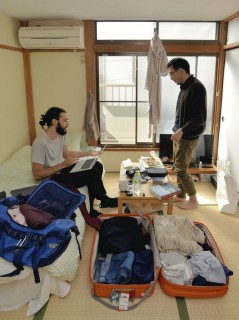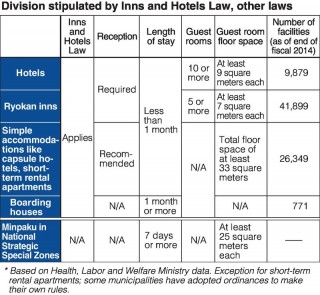Search
▼ New Regulations Eyed For ‘Minpaku’ Lodgings
- Category:Tourism

JAPAN NEWS
The Health, Labor and Welfare Ministry and the Japan Tourism Agency will establish rules for “minpaku” businesses, which offer vacant rooms at condominiums and other private homes as accommodation for tourists, as early as this autumn.
Minpaku are considered an effective way to make up for a shortage of accommodation facilities amid a rapidly increasing number of foreign visitors to Japan. However, relevant regulations have not kept up with developments in the industry, causing a number of difficulties.
The ministry and agency will designate minpaku as a category of simple accommodations (see below) under the Inns and Hotels Law to help the business expand appropriately.
“This room is inexpensive and comfortable. I’d like to enjoy my visit to Tokyo,” said a 24-year-old man from Italy who came to Japan to study architecture.
He chose minpaku instead of a relatively expensive rental agreement. He rented a Japanese-style room in a detached house in an upscale residential area of Minato Ward, Tokyo, for ¥7,500 per night for two months until December last year.
An information technology company executive who provided him with
the room, after receiving permission from the landlord, welcomed him, saying, “I’m happy that I can interact with people with different cultures.”
The Italian found the room via Airbnb, a U.S. website that operates as an intermediary for minpaku. About 20,000 hosts have registered with the site already in Japan. As of June 2015, about 520,000 visitors to the country had used the site over the past year. Companies offering similar services have appeared one after another.
As minpaku providers receive money from visitors in return for their stay, it is necessary in principle for minpaku operators to obtain permission from local governments under the Inns and Hotels Law if they let people stay repeatedly. However, most minpaku services offered online are arranged without permission.
Some local governments, such as Tokyo’s Ota Ward and Osaka Prefecture, actively promote minpaku by utilizing the National Strategic Special Zone system and do not require minpaku hosts to seek permission.
The rapid expansion of the minpaku business has caused an increasing number of difficulties. Such complaints are heard as, “Foreign strangers have been spotted in our condominium,” or “Strangers are speaking loudly in shared spaces.”
According to the health ministry, local governments nationwide have learned about 131 unauthorized minpaku businesses in fiscal 2014, in response to reports from neighbors. The figure is said to be more than double that of the previous fiscal year.
In December last year, Kyoto prefectural police sent documents to the public prosecutors office against three firms and related parties on suspicion of violating the Inns and Hotels Law for conducting an unauthorized minpaku business using rented rooms in Kyoto.
Guest list requirement
Utilizing the National Strategic Special Zone system, the government of Ota Ward, Tokyo, will put into effect an ordinance that requires hosts who have visitors stay for six nights or longer to enter the minpaku business on Jan. 29, allowing them to offer services from as early as the middle of February.
The ordinance makes it mandatory for hosts to inform nearby residents of their business plans in advance. They will also be obliged to respond to emergencies such as fires and noise around the clock.
The new rule assumes that operators will rent out rooms without staying at minpaku facilities with customers themselves. If operators do stay at minpaku facilities with customers, problems such as garbage and noise are not likely to occur. Therefore, the ministry has considered relaxing regulations by introducing a system under which operators would simply have to notify the authorities, rather than a license system.
The ministry will also ease the current regulations on the floor space of facilities so that minpaku services can be offered even using one-room apartments.
On the other hand, the ministry plans to require minpaku operators to make lists of guests, which all operators of hotels and inns are obliged to do, for security and countermeasures against infectious diseases.
According to the Fire and Disaster Management Agency, if half or more of the floor space of a house is used as a minpaku facility, fire extinguishers and alarms should be installed in the facility. In the case of hotels and inns with capacity for more than 30 people, operators are obliged to conduct fire drills. Even though minpaku operators are not subject to this requirement because of the small number of guests, the operators will be required to take measures as foreign tourists may not know how to use an extinguisher.
■ Simple accommodations
A type of accommodation where a number of people share a place to stay. They are included in one of the four business categories stipulated under the Inns and Hotels Law. This category includes capsule hotels, mountain cabins and youth hostels as well as short-term rental apartments and guesthouses in some cases.
- January 7, 2016
- Comment (0)
- Trackback(0)

